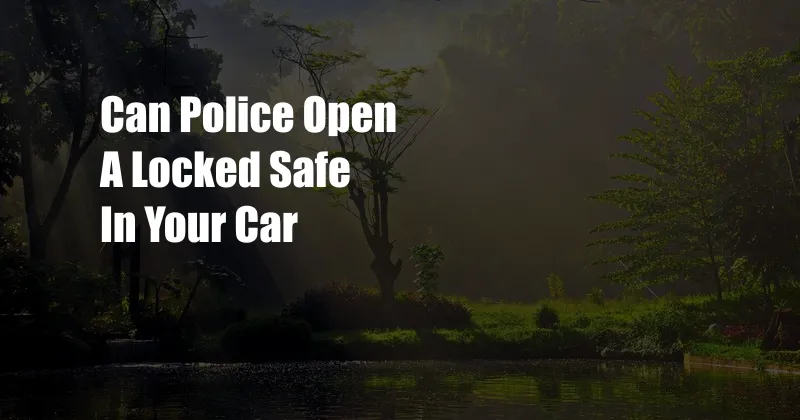
Can Police Open a Locked Safe in Your Car?
Law enforcement officers have specific guidelines they must follow when interacting with civilians. These guidelines include the need for a warrant or probable cause to search a vehicle or its contents. However, there are some circumstances in which the police may be able to open a locked safe in your car without a warrant.
When Police Can Open a Locked Safe in Your Car
According to the Fourth Amendment of the U.S. Constitution, individuals have the right to be secure in their persons, houses, papers, and effects. This means that the police cannot search your car or your belongings without a warrant, unless they have probable cause to believe that you have committed a crime.
However, there are several exceptions to this rule. One exception is if you consent to the search. If you give the police permission to search your car, they can open any locked containers, including safes.
Another exception is if the police have probable cause to believe that the safe contains evidence of a crime. For example, if the police have arrested you for drug possession and they believe that you have hidden drugs in a safe in your car, they may be able to obtain a warrant to search the safe.
Finally, the police may be able to open a locked safe in your car if they have reason to believe that the safe poses a threat to public safety. For example, if the police have received a report that you have a bomb in your car, they may be able to open the safe to investigate.
What to Do if the Police Open Your Safe
If the police open your safe without your consent, you should ask them for a copy of the warrant. If they do not have a warrant, you should contact an attorney. You may be able to file a motion to suppress any evidence that was obtained from the safe.
Tips and Expert Advice
In most cases, the police will not be able to open a locked safe in your car without a warrant. However, there are several things you can do to protect yourself:
- Do not consent to searches of your vehicle or belongings.
- Keep your valuables in a safe place.
- If the police do open your safe, ask for a copy of the warrant.
- Contact an attorney if you believe your rights have been violated.
Frequently Asked Questions
Q: Can the police search my car without a warrant?
A: No, the police cannot search your car without a warrant, unless they have probable cause to believe that you have committed a crime.
Q: What is probable cause?
A: Probable cause is a reasonable belief that a crime has been committed. This belief must be based on specific facts and circumstances.
Q: What should I do if the police open my safe without my consent?
A: You should ask for a copy of the warrant. If they do not have a warrant, you should contact an attorney.
Conclusion
The Fourth Amendment of the U.S. Constitution protects individuals from unreasonable searches and seizures. This includes the right to keep your belongings secure. However, there are several exceptions to this rule. The police may be able to open a locked safe in your car if you consent to the search, if they have probable cause to believe that the safe contains evidence of a crime, or if they have reason to believe that the safe poses a threat to public safety.
If you are concerned about the police searching your car or belongings, you should talk to an attorney. An attorney can help you understand your rights and protect your privacy.
Are you interested in learning more about the Fourth Amendment?